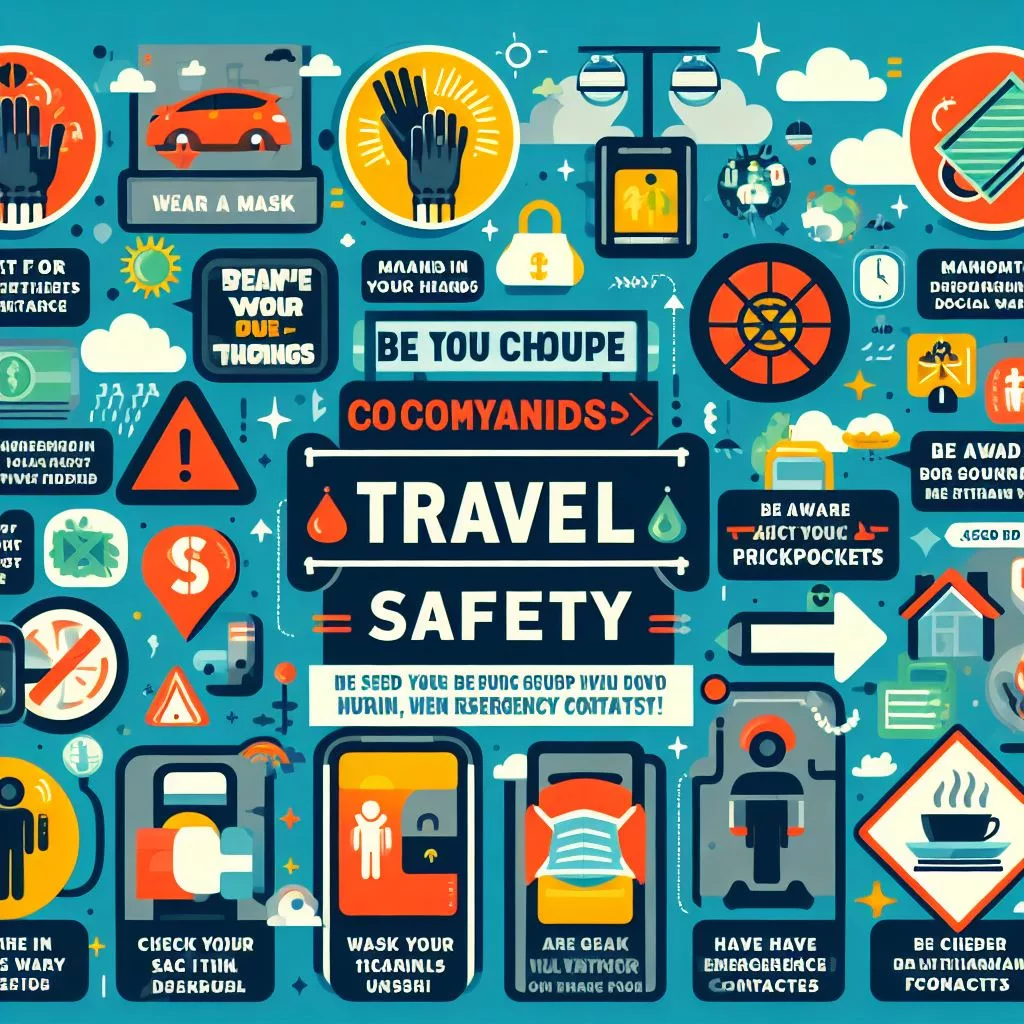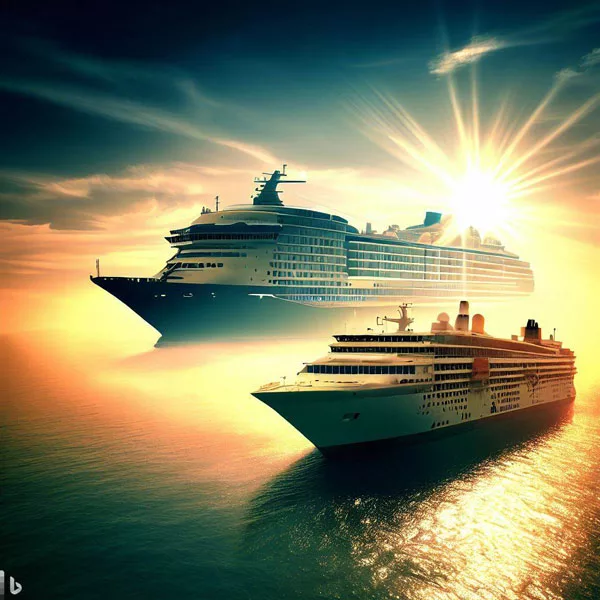Cruise Safety: Charting a Course for Peace of Mind
- Introduction
- Cruise Safety Tips: Your Compass to Safe Sailing
- Are Cruises Safe from Sinking? Dispelling Deep-Sea Myths
- Royal Caribbean Cruise Safety: Sailing with the Kings and Queens of the Sea
- Carnival Cruise Safety: More than Just a Floating Fiesta
- Caribbean Cruise Safety: Sun, Sea, and Safety
- Battling Buccaneers: Are Cruise Ships Safe from Pirates?
- Cruising Post-Pandemic: Are Cruises Safe with Covid in 2025?
- Setting Sail in 2025: Are Cruises Safe?
- Conclusion
- Frequently Asked Questions
Introduction
Hey retirees! Dreaming of the open seas, tropical destinations, and buffet dinners?
Cruises are a great way to see the world, but safety should always be at the top of the mast.
Let’s get into the nitty-gritty of cruise safety so your next voyage is as smooth as the calm Caribbean waters.
Cruise Safety Tips: Your Compass to Safe Sailing
Safety on a cruise is like sunscreen on a beach day – it’s essential. Here are some top tips to keep you safe and sound:
- Stay Ship Shape: Those safety drills at the beginning of your cruise? They’re not just a formality. Attend them, pay attention, and take them seriously. They might not be as fun as the limbo competition, but they’re important. Think of them as the seatbelt demonstration on an airplane but with more flair. During these drills you’ll learn how to find your muster station and get instructions on how to properly use a life jacket.
- Know Your Ship: Get to know the ship’s layout as soon as you board. It’s not just about finding the quickest way to the buffet or the pool deck. Knowing where the nearest exits and lifeboats are can be lifesavers in an emergency. Also be aware of restricted areas on the ship and avoid them to stay safe.
- Keep Your Sea Legs: Cruise ships are like floating cities, and just like in a city, accidents can happen. Watch your step, be careful of wet decks and always use handrails when available. If an emergency occurs communicate with crew members right away. And maybe skip that extra margarita if you’re planning to dance the night away—excessive alcohol consumption can lead to accidents and should be avoided for your safety.
Are Cruises Safe from Sinking? Dispelling Deep-Sea Myths
The Titanic might have made for a great movie but modern ships like large cruise ships are nothing like their 20th century counterparts.
Today’s vessels are marvels of engineering with advanced stabilization systems, multiple watertight compartments and state of the art navigation.
Incidents like the Costa Concordia disaster off the coast of Italy are a reminder why safety protocols and regulations are in place on large cruise ships even though such events are extremely rare.
So while the idea of a ship sinking is scary it’s also extremely rare. Rest easy knowing that cruise lines put your safety first.
Royal Caribbean Cruise Safety: Sailing with the Kings and Queens of the Sea
Royal Caribbean is known for their luxurious ships and top notch entertainment but did you know they’re also leaders in safety?
Their fleet is equipped with state of the art navigation systems and their crew undergoes rigorous training. From fire drills to man overboard procedures Royal Caribbean makes sure their staff is prepared for any situation.
So while you’re enjoying that Broadway style show or zip lining adventure know you’re in good hands.
When comparing Royal Caribbean’s safety standards to other premium cruise lines like Celebrity Cruises it’s worth noting that ships like the Celebrity Edge feature innovative design elements including an advanced bow design that further enhances passenger safety and comfort at sea.
Carnival Cruise Safety: More than Just a Floating Fiesta
Carnival Cruise Line promises fun for all ages but they also deliver on safety as part of the cruise experience. On ships like the Carnival Conquest guests participate in mandatory muster drills to learn important safety procedures. Their ships are designed with the latest safety technologies and their crew is trained to handle emergencies. Plus with a medical center on board staffed with medical staff including qualified doctors and nurses who are trained to provide emergency care and handle minor ailments you’re always in good hands.
Caribbean Cruise Safety: Sun, Sea, and Safety
The Caribbean is a dream destination for many with its turquoise waters, white sandy beaches and vibrant cultures.But cruising in this tropical paradise comes with its own set of safety considerations. From unpredictable weather to navigating busy ports, cruise lines take extra precautions in the Caribbean. When the ship is docked at a port there are unique safety concerns including managing the limited time available for shore excursions and trips to nearby islands. Excursions are a popular way for passengers to explore islands safely and efficiently during the short time the ship is in port.
They monitor weather patterns closely, adjust itineraries if needed and make sure passengers are well informed about safety protocols on and off the ship.
Battling Buccaneers: Are Cruise Ships Safe from Pirates?
Modern day pirates might sound like something out of a Hollywood movie but piracy is a real concern in certain parts of the world.
But fear not! Cruise lines are well prepared. They avoid high risk areas, employ security teams and even use technology like long range acoustic devices to deter potential threats. And no, Johnny Depp is not on board.
Cruising Post-Pandemic: Are Cruises Safe in 2025?
The world has changed but cruises have adapted. With the onset of the Covid-19 pandemic the cruise industry revamped its health and safety protocols.
Disease control measures are especially important on cruise ships due to the close quarters and the presence of more passengers which can increase the risk of illness spreading among cruise ship passengers.
From enhanced cleaning procedures to upgraded air conditioning and filtering systems cruise lines have gone above and beyond to ensure passenger safety.
Regular testing, vaccination requirements and onboard medical facilities equipped to handle potential cases are now the norm.
So while the world might be different the essence of cruising remains the same: adventure, relaxation and unforgettable memories.
Setting Sail in 2025: Are Cruises Safe?
With technology advancements, strict safety measures and an industry committed to passenger well being cruising in 2025 is safer than ever. One major advantage is the implementation of modern technologies that enhance protection and response capabilities on board cruise ships. Fortunately current safety protocols on today’s cruise ships are highly effective providing peace of mind for travelers.
Whether you’re a seasoned sailor or a first time cruiser the open seas await. So grab that captain’s hat, pack your bags and let’s set sail for a lifetime of adventure!
Conclusion: Ready to set sail?
With the right knowledge your cruise can be both fun and safe. From the depths of the ocean to the heart of the Caribbean adventure awaits. So, anchors away and let’s make some waves!
Frequently Asked Questions
What are the top cruise safety tips every traveler should know?
– Attend the mandatory safety drills. – Get familiar with the ship’s layout especially exit routes. – Use handrails especially on wet decks or rough seas. – Store valuables in the in-room safe. – Follow onboard guidelines especially during excursions.
How often do cruise ships sink?
While the idea might be terrifying modern cruise ships sinking is an extremely rare occurrence. With advanced engineering, technology and safety protocols cruise lines put passenger safety first.
How does Royal Caribbean ensure passenger safety?
Royal Caribbean has state of the art navigation systems and their crew undergoes rigorous training. They conduct regular drills and have protocols for various emergencies so passengers are in good hands.
Are medical facilities available on Carnival Cruise ships?
Yes, Carnival Cruise Line ships have medical centers staffed with qualified doctors and nurses to handle minor and major medical situations.
Is piracy a real concern for cruise ships?
While piracy exists in certain parts of the world, cruise lines take extra precautions. They avoid high risk areas, employ security teams and use technology to deter potential threats. Modern day piracy is minimal for most popular cruise routes.
What health and safety measures have cruise lines implemented post-Covid-19?
Cruise lines have enhanced cleaning procedures, upgraded air filtration systems and introduced regular testing and vaccination requirements. Onboard medical facilities are equipped to handle potential cases so passenger safety is paramount.
Are there specific regions where cruises are safer?
Cruise lines prioritize safety regardless of the region. However they monitor global events, weather patterns and other factors to adjust itineraries if needed to ensure passenger and crew safety.
How can I stay safe during shore excursions?
Follow the guidelines provided by the cruise line. Stick to recommended areas, be aware of your surroundings and avoid risky behavior. It’s also a good idea to travel in groups during excursions.
Are there any age specific safety tips for seniors on cruises?
Seniors should bring all necessary medications and inform the cruise line of any special needs. It’s also good to choose excursions that fit your physical abilities and stay hydrated.
How do cruise lines handle onboard threats or emergencies?
Cruise ships have security personnel trained for various situations. In case of emergencies the crew follows protocols and passengers are directed to safe areas or muster stations.
Remember, while it’s good to be informed and prepared cruises are meant to be fun. With the right knowledge your journey can be safe and enjoyable. Happy sailing!



